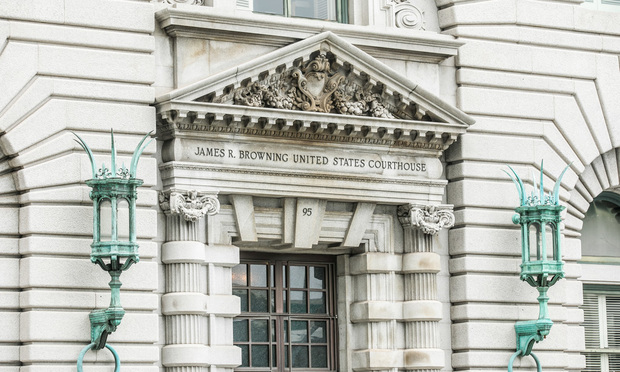Trump Tweets and Litigation Risks: Key Takeaways From 9th Circuit's DACA Hearing
The Justice Department questioned the court's reviewability of the rescission, while three different lawyers for plaintiffs urged the judges to affirm the lower court's finding that the rescission was likely “arbitrary and capricious.”
May 15, 2018 at 07:13 PM
5 minute read

The Ninth Circuit grappled with the president's tweets and agency discretion during oral arguments on the administration's decision to rescind the Obama-era immigration policy known as Deferred Action for Childhood Arrivals.
U.S. District Judge William Alsup of the Northern District of California partly blocked the Trump administration's decision in January, ordering the government to continue processing renewal applications for existing DACA recipients. The Supreme Court later rejected an appeals request by the Justice Department, sending the case back to the Ninth Circuit.
During Tuesday's arguments, Justice Department lawyer Hashim Mooppan questioned the court's reviewability of the rescission, while three different lawyers for plaintiffs urged the judges to affirm the lower court's finding that the rescission was likely “arbitrary and capricious.”
Covington & Burling partner Jeffrey Davidson argued pro bono on behalf of the Regents of the University of California system, California Deputy Solicitor General Michael Mongan argued for the state and Public Counsel Director Mark Rosenbaum argued for the individual plaintiffs.
Here are four key takeaways from the oral arguments before the U.S. Court of Appeals for the Ninth Circuit on Tuesday:
Courts' Ability to Review DACA Remains a Big Question
The first part of oral arguments centered around the government's claim that the Trump administration's DACA rescission is not reviewable by courts because it's a “discretionary enforcement decision.” Judges Jacqueline Nguyen and Kim McLane Wardlaw—both Obama nominees—pushed back.
Wardlaw pointed out that then-acting Department of Homeland Secretary Elaine Duke's “decision to rescind appears to be based entirely on” a letter from U.S. Attorney General Jeff Sessions. That letter suggested the Fifth Circuit's finding in 2015 that Deferred Action for Parents of Americans was unlawful, and should contribute to DACA's rescission.
“If that is wrong as a matter of law, which is as Judge Alsup said, a question essentially for the courts, can the decision to rescind stand?” Wardlaw asked. Mooppan maintained the matter was still nonreviewable.
Wardlaw also urged Mooppan to square how the Fifth Circuit found DAPA to be reviewable, but not the wind-down of DACA. Mooppan said the Fifth Circuit found that DAPA “so exceeded the congressional scheme that it ceased to be a valid prosecutorial discretion policy.”
Concerns Over Equal Protection Clause
While Alsup granted a nationwide injunction on the basis that plaintiffs would succeed on their claims that the rescission was “arbitrary and capricious” under the Administrative Procedure Act, Owens raised the question of whether the court could consider the equal protection clause.
“Let's say that I have concerns over justiciability on the APA claim. But let's say I think your equal protection clause claim is strong. … If we were to say APA is a loser but motion to dismiss—Judge Alsup got that right—procedurally where are we in this case?” Owens said.
Rosenbaum argued the court could affirm the injunction on Equal Protection grounds too.
The exchange raised more questions about Trump's tweets and past statements about DACA recipients. In his follow-up, the DOJ lawyer said the DHS secretary was ultimately responsible for the decision to rescind DACA, which Owens pushed back on.
“At a minimum, [plaintiffs' lawyers] have to have clear evidence of discriminatory intent. They don't have a single allegation in their complaint about the acting secretary's motive in this case,” Mooppan said.
Owens pushed back on that notion.
“Right, but the acting secretary ultimately reports to the POTUS and he has said all kinds of things that could be relevant in this litigation,” he said, before acknowledging the panel would have to wait for the Supreme Court's ruling in the travel ban case to fully evaluate such statements.
DACA Lawful, and a Litigation Risk?
The DACA rescission memo remained an issue for the panel, with the judges squarely asking both sides whether DACA was lawful. The Justice Department lawyer maintained it was not, but that the Trump administration's reasoning for rescinding DACA also included the risk of litigation.
Mongan, representing the state of California, disagreed that DACA was unlawful—but he added he was not sure whether the “litigation risk was reasonably discerned in the memo.” Even if it were, it would not affect its reviewability, he said.
DOJ Considering Redoing DACA Rescission Memo
Nguyen also asked Mooppan whether the Justice Department—in light of a recent decision by U.S. District Judge John Bates of the District of Columbia—would redo its DACA rescission memo.
Bates enjoined the Trump administration's DACA wind-down in April, ordering the United States to resume accepting applications for both new and existing DACA recipients. But he gave the government 90 days to issue a new memo before his injunction went into effect.
Mooppan replied that a re-do of the rescission memo was something the administration was still considering. “We're actively considering it, but we of course think the Duke memo is itself sufficient … we're actively considering what to do in light of the” Bates opinion.
Read More:
Trump Administration Set for Third Appeal Over DACA Suit to Head to Second Circuit
Why Judge John Bates Embraced 'Undocumented' Over 'Illegal' in DACA Ruling
Trump's Statements Focused On, Propelling DACA Suit Forward
Trump's Newest Tweet Target: Solicitor General Noel Francisco
This content has been archived. It is available through our partners, LexisNexis® and Bloomberg Law.
To view this content, please continue to their sites.
Not a Lexis Subscriber?
Subscribe Now
Not a Bloomberg Law Subscriber?
Subscribe Now
NOT FOR REPRINT
© 2025 ALM Global, LLC, All Rights Reserved. Request academic re-use from www.copyright.com. All other uses, submit a request to [email protected]. For more information visit Asset & Logo Licensing.
You Might Like
View All
Buchalter Hires Longtime Sheppard Mullin Real Estate Partner as Practice Chair

Reality TV Couple and Pacific Palisades Neighbors Sue City of Los Angeles Over Loss of Homes to Fire
3 minute read
In Resolved Lawsuit, Jim Walden Alleged 'Retaliatory' Silencing by X of His Personal Social Media Account

No Two Wildfires Alike: Lawyers Take Different Legal Strategies in California
5 minute readTrending Stories
- 1We the People?
- 2New York-Based Skadden Team Joins White & Case Group in Mexico City for Citigroup Demerger
- 3No Two Wildfires Alike: Lawyers Take Different Legal Strategies in California
- 4Poop-Themed Dog Toy OK as Parody, but Still Tarnished Jack Daniel’s Brand, Court Says
- 5Meet the New President of NY's Association of Trial Court Jurists
Who Got The Work
J. Brugh Lower of Gibbons has entered an appearance for industrial equipment supplier Devco Corporation in a pending trademark infringement lawsuit. The suit, accusing the defendant of selling knock-off Graco products, was filed Dec. 18 in New Jersey District Court by Rivkin Radler on behalf of Graco Inc. and Graco Minnesota. The case, assigned to U.S. District Judge Zahid N. Quraishi, is 3:24-cv-11294, Graco Inc. et al v. Devco Corporation.
Who Got The Work
Rebecca Maller-Stein and Kent A. Yalowitz of Arnold & Porter Kaye Scholer have entered their appearances for Hanaco Venture Capital and its executives, Lior Prosor and David Frankel, in a pending securities lawsuit. The action, filed on Dec. 24 in New York Southern District Court by Zell, Aron & Co. on behalf of Goldeneye Advisors, accuses the defendants of negligently and fraudulently managing the plaintiff's $1 million investment. The case, assigned to U.S. District Judge Vernon S. Broderick, is 1:24-cv-09918, Goldeneye Advisors, LLC v. Hanaco Venture Capital, Ltd. et al.
Who Got The Work
Attorneys from A&O Shearman has stepped in as defense counsel for Toronto-Dominion Bank and other defendants in a pending securities class action. The suit, filed Dec. 11 in New York Southern District Court by Bleichmar Fonti & Auld, accuses the defendants of concealing the bank's 'pervasive' deficiencies in regards to its compliance with the Bank Secrecy Act and the quality of its anti-money laundering controls. The case, assigned to U.S. District Judge Arun Subramanian, is 1:24-cv-09445, Gonzalez v. The Toronto-Dominion Bank et al.
Who Got The Work
Crown Castle International, a Pennsylvania company providing shared communications infrastructure, has turned to Luke D. Wolf of Gordon Rees Scully Mansukhani to fend off a pending breach-of-contract lawsuit. The court action, filed Nov. 25 in Michigan Eastern District Court by Hooper Hathaway PC on behalf of The Town Residences LLC, accuses Crown Castle of failing to transfer approximately $30,000 in utility payments from T-Mobile in breach of a roof-top lease and assignment agreement. The case, assigned to U.S. District Judge Susan K. Declercq, is 2:24-cv-13131, The Town Residences LLC v. T-Mobile US, Inc. et al.
Who Got The Work
Wilfred P. Coronato and Daniel M. Schwartz of McCarter & English have stepped in as defense counsel to Electrolux Home Products Inc. in a pending product liability lawsuit. The court action, filed Nov. 26 in New York Eastern District Court by Poulos Lopiccolo PC and Nagel Rice LLP on behalf of David Stern, alleges that the defendant's refrigerators’ drawers and shelving repeatedly break and fall apart within months after purchase. The case, assigned to U.S. District Judge Joan M. Azrack, is 2:24-cv-08204, Stern v. Electrolux Home Products, Inc.
Featured Firms
Law Offices of Gary Martin Hays & Associates, P.C.
(470) 294-1674
Law Offices of Mark E. Salomone
(857) 444-6468
Smith & Hassler
(713) 739-1250






